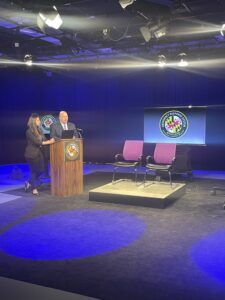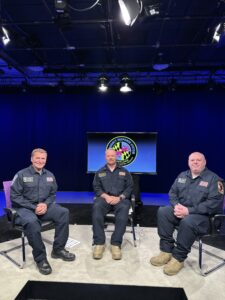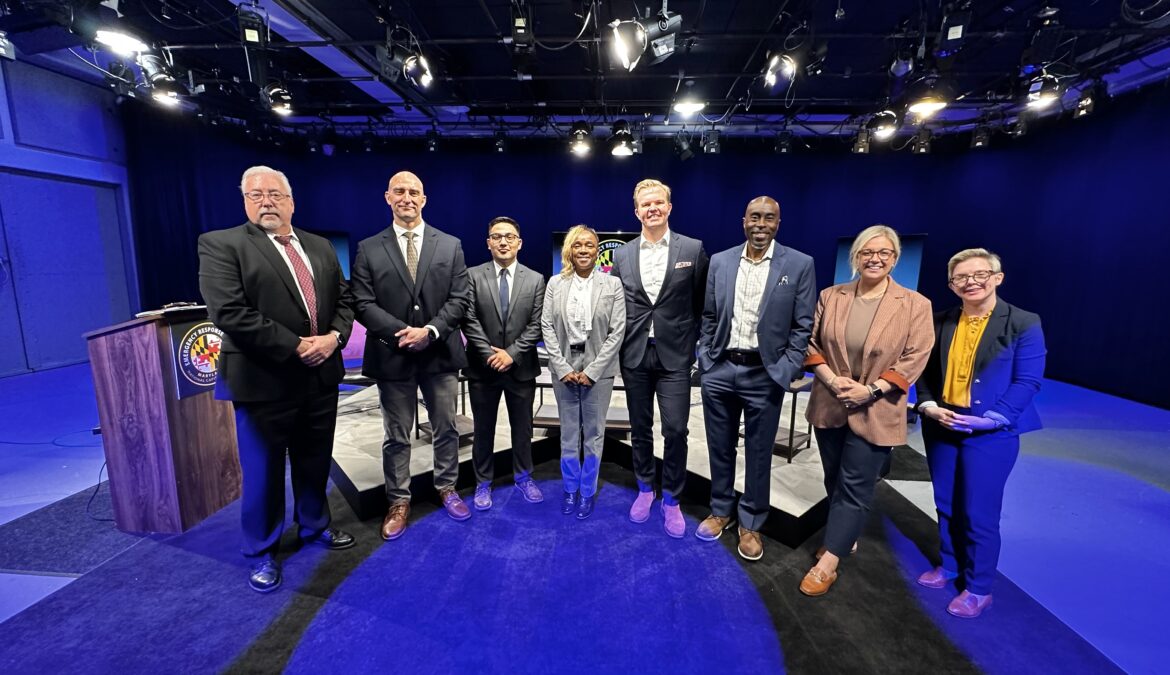The Maryland-National Capital Region Emergency Response System (MDERS) hosted its eighth annual symposium on May 1st and 2nd, bringing industry leaders and distinguished speakers together to discuss pertinent topics related to homeland security threats and response efforts. This year’s symposium theme was Adapting to Emerging Threats: Essentials Insights for Homeland Security and Public Safety Leaders. The two-day virtual event empowered our regional partners and national participants to grasp emerging and evolving threats affecting the homeland security enterprise.
The program began with a panel discussion on emerging technologies in homeland security. Dione “Dee” Neely moderated the conversation and was joined by Arlington County Fire Chief David Povlitz, Associate Chief of Strategic Technology for Cybersecurity & Infrastructure Security (CISA) Dr. Garfield Jones, Maryland Department of Information Technology Director Netta Squires, Chief Operating Officer of Frontier Foundry Nick Reese, and the Commander of the Miami Police Department’s Cyber Crimes Bureau Major George Perera. The panelists explored the impact of integrating the latest technologies, including artificial intelligence (AI), to enhance various emergency response capabilities, address data security challenges, and highlight ethical considerations faced by organizations when using advanced technology. Symposium attendees posed a variety of questions to the panelists to facilitate discourse that embraced the overall use of technology as a pathway to opportunity and modernization. The breadth of this discussion supplied participants with lessons learned and best practices for shaping the future of first responder agencies harnessing and implementing innovative technologies into their response operations.
Day two of the program featured discipline-specific homeland security topics, such as mass casualty incident care involving patients with penetrating trauma, combating human trafficking, water infrastructure resilience, and the response to the devastating Hawaii wildfires in 2023. The morning started with a hospital case study presentation by Dr. Kevin Menes of Menes Resuscitation, LLC. Dr. Menes, based on his unique experience with the 2017 Las Vegas shooting, stressed the significance of mass casualty preparedness for all disciplines. Response efforts to a large-scale incident can quickly become complicated and Dr. Kevin Menes shared his insights on how to manage an influx of patients and provided recommendations on how to plan and prepare for a potential mass casualty incident.
The hospital case study was followed by a presentation on human trafficking, including  child and sex trafficking crimes. The presenters, Sergeant Greg Flores and Detective Julia Tafesh of the Las Vegas Metropolitan Police Department (LVMPD), discussed proactive investigation strategies implemented to arrest offenders and innovative approaches to reduce violent crimes associated with human trafficking. During the 2023 Formula 1 and Super Bowl, the pair analyzed how LVMPD’s tactical investigation methods have contributed to a significant number of arrests and recovery of victims.
child and sex trafficking crimes. The presenters, Sergeant Greg Flores and Detective Julia Tafesh of the Las Vegas Metropolitan Police Department (LVMPD), discussed proactive investigation strategies implemented to arrest offenders and innovative approaches to reduce violent crimes associated with human trafficking. During the 2023 Formula 1 and Super Bowl, the pair analyzed how LVMPD’s tactical investigation methods have contributed to a significant number of arrests and recovery of victims.
Next, David McDonough and Eric “Joey” Curtis from the Washington Suburban Sanitary Commission (WSSC) presented on adapting to an evolving climate. The pair analyzed the impact of climate change as a threat to water quality and steps agencies can take to plan, collaborate, mitigate, and respond to the threat extreme weather poses to this critical infrastructure. Mr. McDonough and Mr. Curtis concluded their presentation with a case study about the correlation between climate change and water main breaks and the cascading effects these events have on our region.
Wrapping up the program, a panel discussion delved into the deployment and response strategies during the 2023 Hawaii wildfires. Dr. Brett Russell, Lieutenant Victor “Tony” Galladora, and Captain Jason Light from Maryland Task Force 1 (MD-TF1) provided insights into the formidable challenges they faced, and the coordinated efforts taken. They highlighted the critical deployment of specialized safety operations, medical resources, incident personnel, and search equipment, all aimed at mitigating the  devastating impact of the wildfires. The panelists explored how MD-TF1 performed large-scale searches of collapsed structures and vehicles to identify missing persons, recover valuables, and investigate loss of life. The MD-FT1 was equipped with an experienced medical team consisting of physicians and paramedics who treated life-threatening injuries and illnesses caused by the wildfires. While operating for seven days to mitigate the impact of the wildfires, the panelist emphasized the importance of mental health treatment and peer support to help incident personnel transition back into their daily roles.
devastating impact of the wildfires. The panelists explored how MD-TF1 performed large-scale searches of collapsed structures and vehicles to identify missing persons, recover valuables, and investigate loss of life. The MD-FT1 was equipped with an experienced medical team consisting of physicians and paramedics who treated life-threatening injuries and illnesses caused by the wildfires. While operating for seven days to mitigate the impact of the wildfires, the panelist emphasized the importance of mental health treatment and peer support to help incident personnel transition back into their daily roles.
The symposium garnered positive feedback from those who participated in this year’s program. The featured topics were carefully curated to equip the MDERS stakeholder community and other first responders with information and tools that will aid them in their ability to respond to emerging and evolving threats. MDERS extends sincere gratitude to all speakers for their participation, Montgomery Community Media for broadcasting the event, and the MDERS staff that were involved in the planning and execution of this year’s program. MDERS is excited to begin planning for next year’s symposium, the ninth iteration of this successful series.


